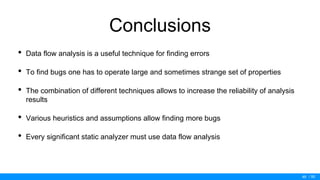The document discusses data flow analysis in static code analysis, detailing its objectives, methods, and significance in error detection within C/C++ projects. It outlines concepts such as flow sensitivity, path-sensitive analysis, and symbolic execution, providing examples of potential errors detected in real code. Overall, data flow analysis is presented as a critical tool for enhancing the reliability of code through advanced analysis techniques.
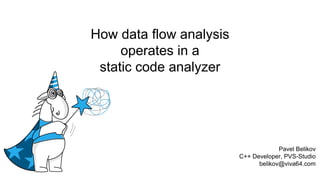
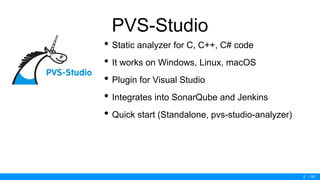
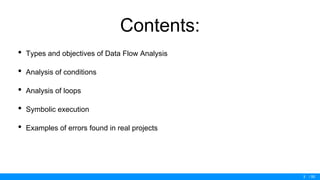
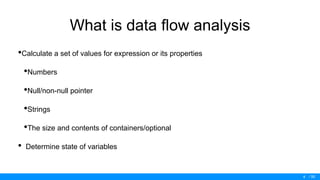
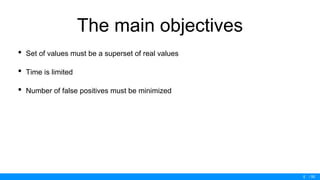
![/ 50
Why do we
need it?
static const int kDaysInMonth[13] = {
0, 31, 28, 31, 30, 31, 30, 31, 31, 30, 31, 30, 31
};
bool ValidateDateTime(const DateTime& time) {
if (time.year < 1 || time.year > 9999 ||
time.month < 1 || time.month > 12 ||
time.day < 1 || time.day > 31 ||
time.hour < 0 || time.hour > 23 ||
time.minute < 0 || time.minute > 59 ||
time.second < 0 || time.second > 59) {
return false;
}
if (time.month == 2 && IsLeapYear(time.year)) {
return time.month <= kDaysInMonth[time.month] + 1;
} else {
return time.month <= kDaysInMonth[time.month];
}
}
6](https://image.slidesharecdn.com/corehard2018en-180503135524/85/How-Data-Flow-analysis-works-in-a-static-code-analyzer-6-320.jpg)
![/ 50
Why do we
need it?
static const int kDaysInMonth[13] = {
0, 31, 28, 31, 30, 31, 30, 31, 31, 30, 31, 30, 31
};
bool ValidateDateTime(const DateTime& time) {
if (time.year < 1 || time.year > 9999 ||
time.month < 1 || time.month > 12 ||
time.day < 1 || time.day > 31 ||
time.hour < 0 || time.hour > 23 ||
time.minute < 0 || time.minute > 59 ||
time.second < 0 || time.second > 59) {
return false;
}
if (time.month == 2 && IsLeapYear(time.year)) {
return time.month <= kDaysInMonth[time.month] + 1;
} else {
return time.month <= kDaysInMonth[time.month];
}
}
7
Protobuf
• V547 / CWE-571 Expression 'time.month <=
kDaysInMonth[time.month] + 1' is always true. time.cc 83
• V547 / CWE-571 Expression 'time.month <=
kDaysInMonth[time.month]' is always true. time.cc 85](https://image.slidesharecdn.com/corehard2018en-180503135524/85/How-Data-Flow-analysis-works-in-a-static-code-analyzer-7-320.jpg)
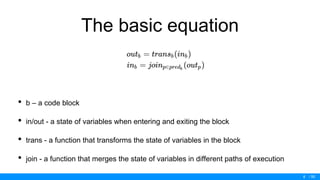
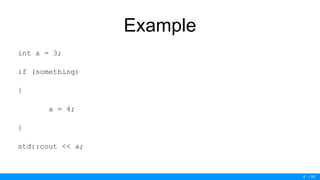
![/ 50
Example
int a = 3; in = {}, out = {a=3}
if (something)
a = 4; in = {a=3}, out = {a=4}
std::cout << a; in = {a=3}∪{a=4}={a=[3;4]}
10](https://image.slidesharecdn.com/corehard2018en-180503135524/85/How-Data-Flow-analysis-works-in-a-static-code-analyzer-10-320.jpg)
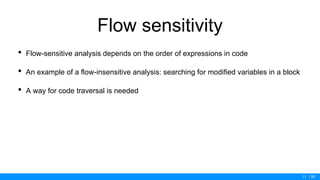
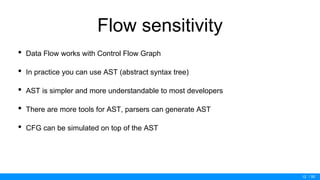
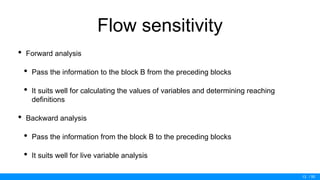
![/ 50
Example of backward analysis
__private_extern__ void
YSHA1Transform(u_int32_t state[5],
const unsigned char buffer[64])
{
u_int32_t a, b, c, d, e;
....
state[0] += a;
state[1] += b;
state[2] += c;
state[3] += d;
state[4] += e;
/* Wipe variables */
a = b = c = d = e = 0;
}
XNU kernel
V1001 CWE-563 The 'a' variable is assigned but is not used until the end of the function. sha1mod.c 120
14](https://image.slidesharecdn.com/corehard2018en-180503135524/85/How-Data-Flow-analysis-works-in-a-static-code-analyzer-14-320.jpg)
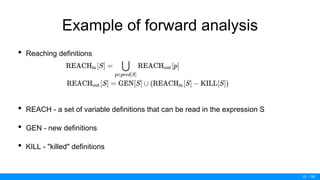
![/ 50
Example of forward analysis
ParseResult ParseOption (string option, ref string[] args , CompilerSettings settings) {
AssemblyResource res = null; GEN={res0}
switch (s.Length) {
case 1:
res = new AssemblyResource (s[0], Path.GetFileName (s[0])); GEN={res1}, KILL={res0}
break;
case 2:
res = new AssemblyResource (s[0], s[1]); GEN={res2}, KILL={res0}
break;
default:
report.Error (-2005, "Wrong number of arguments for option '{0}'", option);
return ParseResult.Error;
}
if (res != null) { ... } REACH={res1, res2}
}
ILSpy
V3022 Expression 'res != null' is always true. settings.cs 827
16](https://image.slidesharecdn.com/corehard2018en-180503135524/85/How-Data-Flow-analysis-works-in-a-static-code-analyzer-16-320.jpg)
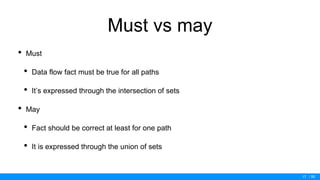
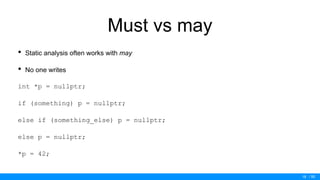
![/ 50
Must vs may
STDMETHODIMP sdnAccessible::get_computedStyle(
BSTR __RPC_FAR* aStyleProperties,
BSTR __RPC_FAR* aStyleValues,
unsigned short __RPC_FAR* aNumStyleProperties)
{
if (!aStyleProperties || aStyleValues || !aNumStyleProperties)
return E_INVALIDARG;
....
aStyleValues[realIndex] = ::SysAllocString(value.get());
....
}
Mozilla Thunderbird
V522 Dereferencing of the null pointer ‘aStyleValues’ might take place. sdnaccessible.cpp 252
19](https://image.slidesharecdn.com/corehard2018en-180503135524/85/How-Data-Flow-analysis-works-in-a-static-code-analyzer-19-320.jpg)
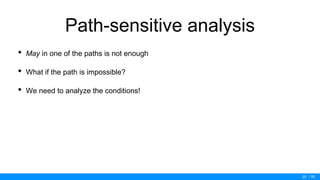
![/ 50
Path-sensitive analysis
enum {
Runesync = 0x80,
Runeself = 0x80,
};
char* utfrune(const char *s, int c) {
....
if (c < Runesync) return strchr(s, c); // c: then [INT_MIN; 0x79] else [0x80; INT_MAX]
for(;;) {
c1 = *(unsigned char*)s;
if (c1 < Runeself) { // c1: then [0; 0x79]
if (c1 == 0) return 0; // c1: then 0 else [1; 0x79]
if (c1 == c) return (char*)s; // if ([1; 0x79] == [0x80; INT_MAX])
....
}
....
}
return 0;
}
RE2 V547 CWE-570 Expression 'c1 == c' is always false. rune.cc 247
21](https://image.slidesharecdn.com/corehard2018en-180503135524/85/How-Data-Flow-analysis-works-in-a-static-code-analyzer-21-320.jpg)
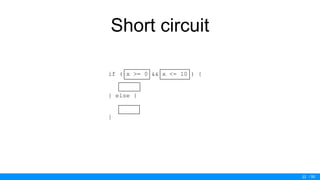
![/ 50
Short circuit
23
x = [0; INT_MAX]
x = [INT_MIN; -1]
if ( x >= 0 && x <= 10 ) {
} else {
}](https://image.slidesharecdn.com/corehard2018en-180503135524/85/How-Data-Flow-analysis-works-in-a-static-code-analyzer-23-320.jpg)
![/ 50
Short circuit
24
x = [0; INT_MAX]
x = [INT_MIN; -1]
x = [0; 10]
x = [11; INT_MAX]
then: x = [0; 10]
else: x = [INT_MIN; -1] ∪ [11; INT_MAX]
x = [0; INT_MAX]
x = [INT_MIN; -1]
if ( x >= 0 && x <= 10 ) {
} else {
}](https://image.slidesharecdn.com/corehard2018en-180503135524/85/How-Data-Flow-analysis-works-in-a-static-code-analyzer-24-320.jpg)
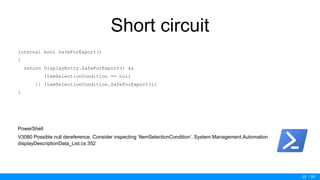
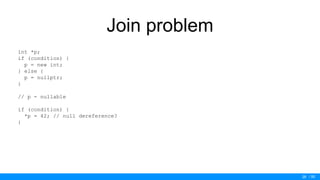
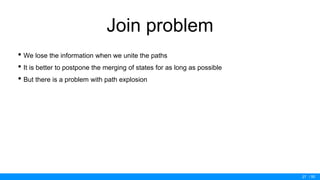
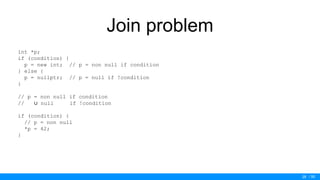
![/ 50
Join problem
int arr[4];
int a, b;
if (condition) {
a = 1;
b = 2;
} else {
a = 2;
b = 1;
}
return arr[a + b]; // a = 1 if condition ∪ 2 if !condition
// b = 2 if condition ∪ 1 if !condition
// a + b = 3 if condition ∪ 3 if !condition
// a + b = 3
29](https://image.slidesharecdn.com/corehard2018en-180503135524/85/How-Data-Flow-analysis-works-in-a-static-code-analyzer-29-320.jpg)
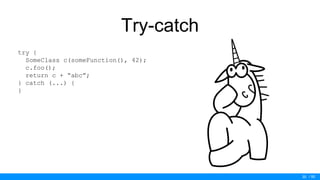
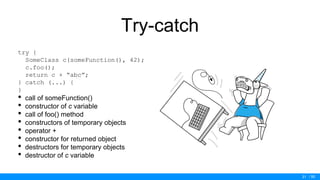
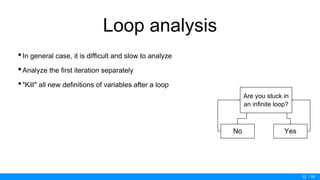
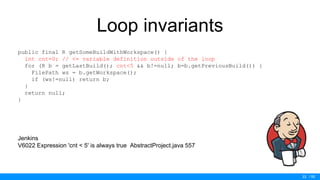
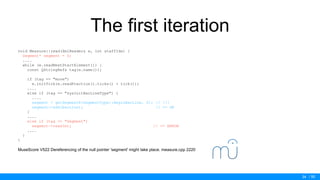
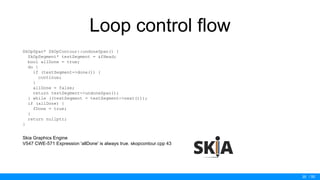
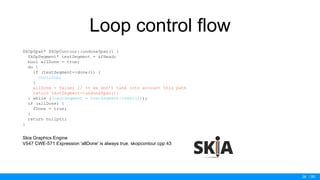
![/ 50
Loop counter analysis
for (int i = 0; i < 10; ++i)
{
// i = [INT_MIN; 9] ?
// i = [0; 9] !!!
}
37](https://image.slidesharecdn.com/corehard2018en-180503135524/85/How-Data-Flow-analysis-works-in-a-static-code-analyzer-37-320.jpg)
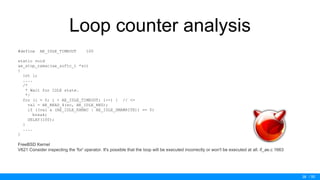
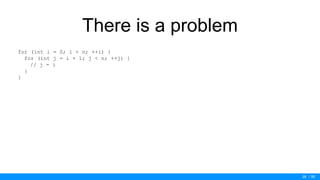
![/ 50
There is a problem
int i = /* [0; 42] */;
int j = i + 1; // [1; 43]
int r = j - i; // [-43; 41]???
40](https://image.slidesharecdn.com/corehard2018en-180503135524/85/How-Data-Flow-analysis-works-in-a-static-code-analyzer-40-320.jpg)
![/ 50
Symbolic execution
int i = /* [0; 42] */;
int j = i + 1; // [1; 43]
int r = j - i; // i + 1 - i = 1
41](https://image.slidesharecdn.com/corehard2018en-180503135524/85/How-Data-Flow-analysis-works-in-a-static-code-analyzer-41-320.jpg)
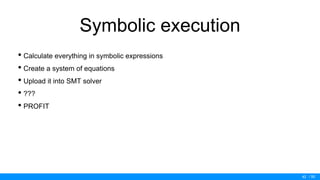
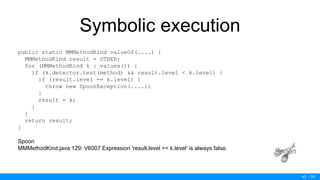
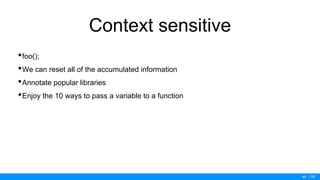
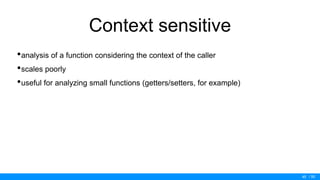
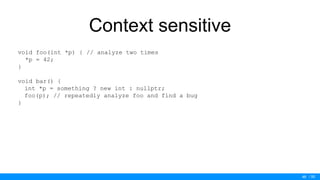
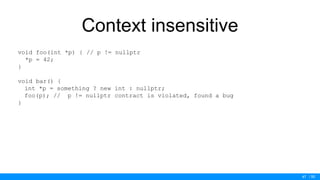
![/ 50
Context insensitive
• Analyze the body of a function, compose an annotation for it
• Contract for arguments
• Presence of a global state
• Returned value
• And much more
• contracts proposal
void foo(const std::vector<int> &indices)
[[expects: !indices.empty()]];
48](https://image.slidesharecdn.com/corehard2018en-180503135524/85/How-Data-Flow-analysis-works-in-a-static-code-analyzer-48-320.jpg)
